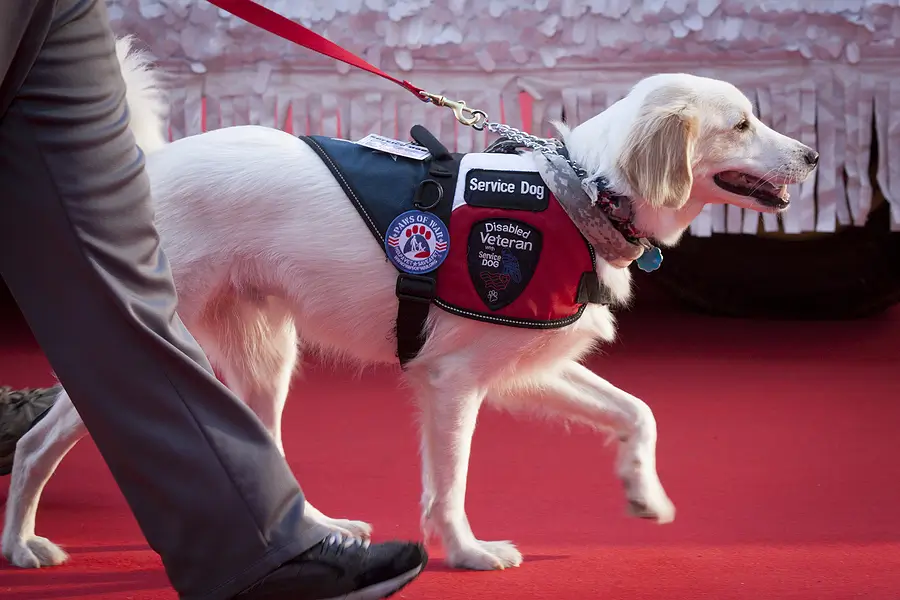Did you know that misunderstandings about service dogs can lead to serious legal headaches? Whether it’s confusing service dogs with emotional support animals or not knowing your legal responsibilities, these misconceptions are more common than you think.
Service dogs play a vital role in assisting people with disabilities, and as a landlord, it’s crucial to know the facts. Myths about service dogs—like needing special certification or only helping people with visible disabilities—can create unnecessary barriers for tenants and put you at risk of violating federal laws like the ADA (Americans with Disabilities Act).
Understanding the truth about a service animal isn’t just about avoiding fines—it’s about being a compassionate and informed landlord. Together, we’ll debunk the most common myths about service dogs to help you confidently manage your Cypress properties.
What Are Service Dogs (and What Are They NOT)?
Service dogs aren’t your typical pets. They’re highly trained assistants who perform specific tasks to help people with disabilities—think guiding someone who is visually impaired or alerting someone before a seizure hits. These incredible animals are like superheroes in fur coats.
But here’s the key: service dogs must be trained to perform tasks that directly relate to a person’s disability, whether it’s physical or mental.
Service Dogs vs. Emotional Support Animals vs. Therapy Dogs
Let’s clear up some confusion:
- Service Dogs: Required by federal law to perform specific tasks for their handler. They have legal rights to go pretty much anywhere.
- Emotional Support Animal: Provides comfort and companionship but aren’t trained to perform tasks. They don’t have the same legal access rights.
- Therapy Dog: Visit hospitals or schools to cheer people up but aren’t tied to one handler’s needs.
If you’ve been lumping these all together, don’t worry—you’re not alone. That’s why we’re here to help.
12 Common Misconceptions About Service Dogs
Despite their crucial role, there are many service dog myths that you need to be aware of as a Cypress landlord:
Myth 1: Service Dogs Need to Be Professionally Trained in a Fancy Program
Nope! The ADA (Americans with Disabilities Act) doesn’t require service dogs to attend an official program. While many service dogs are trained professionally, owners can train them, too, as long as the dog can perform specific tasks.
Myth 2: Only People with Physical Disabilities Use Service Dogs
Service dogs have different types depending on the person's needs. They are lifesavers for people with all kinds of disabilities, including mental health conditions like post-traumatic stress disorder (PTSD), anxiety, and panic attacks. Psychiatric service dogs, for example, are trained to detect oncoming panic attacks and provide grounding techniques for their handlers.
Myth 3: They Need to Be Certified or Registered Online
False! There’s no such thing as an official federal service dog certification. Many online sites selling “official” certificates are scams. Don’t get fooled by fancy papers; the only thing that matters is what the dog is trained to do.
Myth 4: Landlords Can Deny Service Dogs Based on Breed
Under federal law, you can’t deny a tenant’s service dog based on its breed. That means if a tenant shows up with a pit bull or a German shepherd that’s trained to perform specific tasks, you have to accommodate them. Breed restrictions don’t apply here.
Myth 5: You Can Spot a Service Dog a Mile Away
Not all service dogs wear vests, and not all disabilities are visible. For example, someone with a heart condition or a mental health disorder might rely on a service dog even if it’s not immediately obvious why.
Myth 6: They Must Wear a Vest or Harness at All Times
While many service dog handlers opt to outfit their dogs with vests or harnesses to clearly identify them as service animals, it's important to note that this is not a legal requirement. The Americans with Disabilities Act (ADA) does not mandate the use of specific identification. However, wearing a vest or harness can be beneficial in various situations, such as quickly establishing the dog's working status to avoid distractions or potential conflicts. Ultimately, the decision to use identification is up to the individual handler and their specific needs.
Myth 7: Service Dogs Can Go Anywhere
While service dogs have significant public access rights under the Americans with Disabilities Act (ADA), these rights are not absolute. Sterile environments, such as operating rooms, are common exceptions. Additionally, service dogs may be excluded from private residences, businesses open to the public but not serving the public, and certain transportation services in specific circumstances.
Myth 8: Service Dogs are Expensive
The cost of a service dog can vary widely. However, many organizations that provide service dogs offer financial assistance programs, scholarships, and fundraising opportunities to help individuals with disabilities offset these costs. These programs aim to make service dogs more accessible to those who need them, regardless of their financial situation.
Myth 9: They are Always Active and Working
Just like any other dog, service dogs require adequate rest, playtime, and social interaction. While they may be working during certain periods, they also deserve downtime to relax and recharge. This balance is crucial for their overall well-being and ability to continue providing assistance to their handlers effectively.
Myth 10: Service Dogs are Only for Adults and Individuals
Children with autism spectrum disorder, cerebral palsy, or other developmental disabilities often require specialized support to navigate daily challenges. Service dogs can provide invaluable help by performing tasks such as retrieving dropped items, alerting caregivers to potential dangers, and offering comfort during stressful situations. Additionally, service dogs can assist families by providing support to children with disabilities, allowing for greater independence and reducing caregiver burden.
Myth 11: You Can Pet a Service Dog Anytime When You See Them
When a service dog is wearing a harness or vest, it's a clear indication that they are working and focused on assisting their handler. Distractions, such as petting or talking to the dog, can disrupt their concentration and hinder their ability to perform essential tasks. This can potentially compromise the safety and well-being of the individual with a disability.
Myth 12: You Can Take Them Away From Their Handlers
Service dogs are considered extensions of their handlers and are essential for their independence and safety. Businesses must allow service dogs to accompany their handlers in all areas open to the public unless there are specific circumstances where the dog poses a direct threat to the health and safety of others. Any attempt to remove or restrict a service dog is a violation of federal law.
Create Inclusive Rentals by Handling Service Dog Requests Professionally
Navigating the world of service dogs as a Cypress landlord involves more than just following rules—it’s about fostering an inclusive and welcoming environment for tenants who rely on these incredible animals. Understanding the myths and legal requirements surrounding service dogs helps you protect your property while supporting individuals with disabilities. When handled correctly, you foster a community that feels like home to everyone, enhancing tenant satisfaction and retention.
At Terra Residential Services, we specialize in helping landlords like you navigate the complexities of property management. From clarifying service dog laws to updating lease agreements and ensuring compliance with federal, state, and local regulations, our team takes the guesswork out of managing rentals. We provide expert advice, streamlined processes, and personalized support to keep your properties running smoothly while maintaining the highest standards of professionalism and care.
Whether you have questions about service dogs or need assistance with day-to-day operations, we’ve got you covered. Contact us now to learn how we can help you create a more inclusive and successful rental business.
Related Articles:
Tenant Pet Agreement: Is It a Pet or an Assistance Animal?
What Landlords Need to Know About Pets vs Assistance Animals


